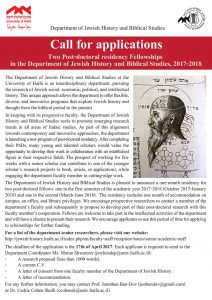Daniel Hershenzon, professor in UConn’s Department of Literatures, Cultures, and Languages and Judaic Studies faculty member, was recently interviewed by the Humanities Institute in a series that features their 2016-2017 Fellows. The interview can be found below.
What is your academic background and what is your current position in UCHI/at UConn/Your Home Institution?
My first degree, from the University of Tel Aviv, is a double major of Philosophy and History. Before getting this degree , I was studying industrial design. I left the world of design for the university when I realized that I was enjoying the history and theory classes much more than the design workshops. After receiving my B.A., I continued to study towards a Masters degree and in 2004 enrolled in a PhD program in the Department of History at the University of Michigan in Ann Arbor. I was lucky to spend two years of my graduate studies researching in Spain (in Madrid, Valladolid, Barcelona, and the Canary Islands!), and another year in Florence, Italy, with a postdoctoral fellowship after I graduated. Then, I took my current position at the Department of Literatures, Cultures, and Languages, where I mostly teach medieval and early modern Spanish history.
What is the project you’re currently working on?
I am completing a book that examines the entangled histories of early modern Spain, Morocco, and Ottoman Algiers, and by extension the entangled lives of Christian and Muslim captives in the region. Captivity was a serious problem in the early modern Mediterranean, and scholars estimate the number of captives, Muslims and Christians, in 2 to 3 millions. The book argues that piracy, captivity, and redemption shaped the sea, a space integrated on the social, economic, and political levels. It demonstrates that despite confessional differences, the lives of Muslim and Christian captives were interrelated and formed part of a single Mediterranean system of bondage. These captivities were connected by a political economy of ransoming shaped by ecclesiastic ransom institutions; Spanish, Ottoman, and Moroccan rulers; captives and kin; and Jewish, Muslim, and Christian ransom intermediaries. They all interacted through texts that captives created and circulated across the sea. The history that emerges from these stories is both local and Mediterranean. It offers a comprehensive analysis of competing Spanish, Algerian, and Moroccan imperial projects intended to shape Mediterranean mobility structures. Simultaneously, the project reveals the tragic upending of the lives of individuals by these imperial maritime political agendas.
How did you arrive at this topic?
I became interested in captivity when I wrote a seminar paper analyzing the autobiographies of former Spanish captives. I was fascinated by how ex captives sought to convince their readers that they did not convert to Islam during their captivity, and yet, their accounts abound with different forms of religious, cultural, and imperial boundary crossing. I also began to see how problematic the absence of Muslim captives from this history is. Finally, I was struck by the importance of writing for captives—not only as a medium to make claims about one’s past after ransom, but also during captivity. Captives constantly wrote letters trying to arrange their ransom, and in its turn, this epistolary circulation extended the boundaries of maritime communities across the sea, putting captives in charge of channeling information about community members who had died, converted as captives, or suffered martyrdom. As importantly, researching Mediterranean captivity allowed me to spend two years in the Mediterranean.
What impact might your work have on a larger public understanding of your topic?
As a historian, I engage in debates on the emergence of European territorial identities, cross-Mediterranean maritime networks, the political economy of forced migration, and the struggle between state and church over that mobility’s control and meaning. I do so by analyzing early modern interactions among 17th century Christian and Muslim captives, enslavers, redeeming friars, merchants, and rulers who struggled to shape piracy, slavery, and redemption according to their shifting vision – religious, economic, and political. The multiple cross-maritime interactions I explore do more than counter an image of a declining 17th-century Mediterranean dissolving into nation-states. They force us to rethink early modern Europe and its others questioning how seemingly European territorial identities were shaped by transnational maritime networks and their transformation. In this sense, the framework that my book proposes for the history of the early modern Mediterranean and Europe have repercussions beyond that specific history and can provide a lens through which to understand the current ongoing crisis surrounding mobility across the sea.
The original post by the Humanities Institute can be found here.


